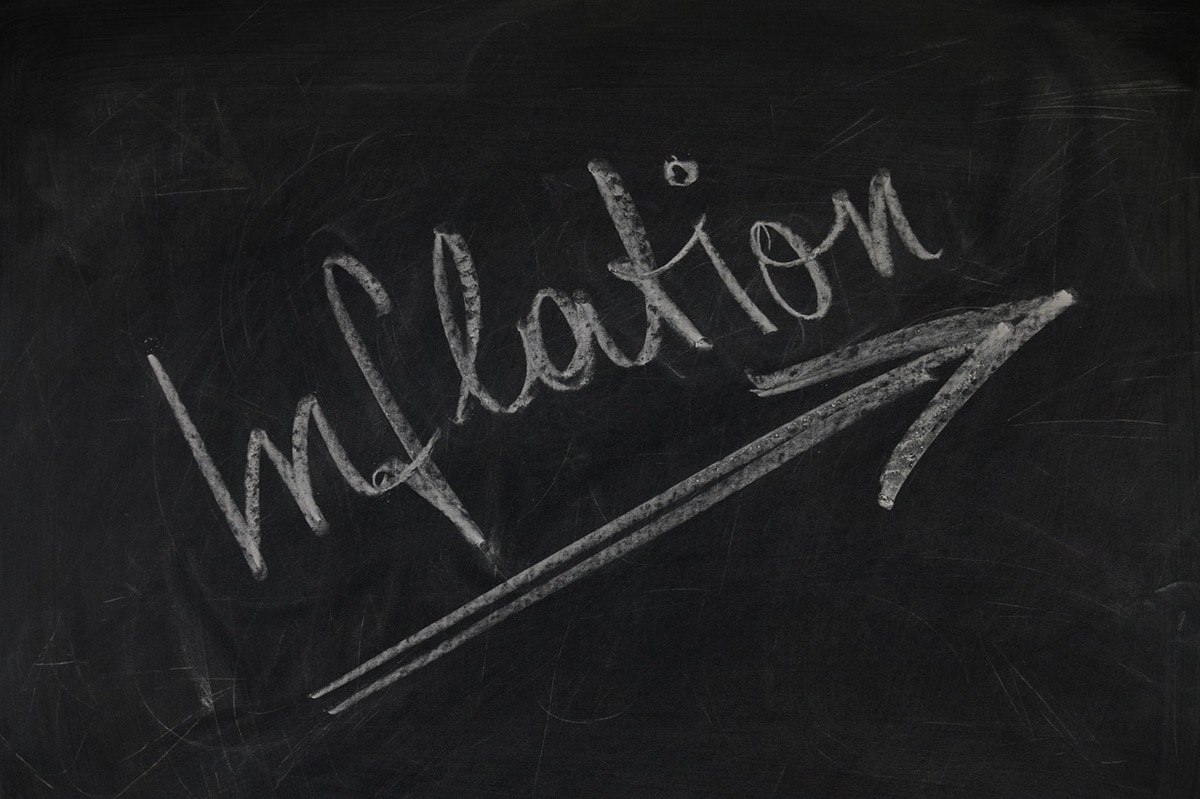In September, in the United States, the rate of price growth demonstrated a level that exceeded preliminary expectations for the dynamic of the corresponding indicator.

At the same time, an increase in the number of jobless claims was recorded in the mentioned country last month. This indicator turned out to be on a growth trajectory after Hurricane Helene. The relevant information was published on Thursday, October 10, by the United States Labor Department.
The consumer price index, a broad gauge measuring the cost of goods and services in the space of the US economic system, increased by 0.2% for September. It is worth noting that seasonal fluctuations were taken into account within this indicator. Currently, the annual inflation in the United States is at 2.4%. It is also worth noting that both mentioned indicators exceeded the figures provided by the Dow Jones consensus forecast by 0.1%.
The annual inflation in the United States in September was 0.1% lower compared to the data recorded in August. It is also worth paying attention to the fact that the corresponding indicator is currently at the mark, which is the lowest since February 2021.
Core prices in the United States rose 0.3% for September. At the same time, the corresponding annual rate is at 3.3%. It should be clarified that the core price data does not take into account the cost of food and energy. In this case, both indicators turned out to be 0.1% higher than the figures provided by the Dow Jones consensus forecast.
A press release from the Bureau of Labor Statistics of the United States notes that the increase in inflation is largely due to factors such as the growth in food prices by 0.4% and an upward dynamic in shelter costs, within which the corresponding indicator rose by 0.2%. At the same time, these economic circumstances were offset by a drop in the price of energy, which amounted to 1.9%.
Also, the upward trajectory of the inflationary process is associated with factors such as an increase in prices for used vehicles by 0.3% and for new vehicles by 0.2%. Moreover, medical care services rose by 0.7% in the cost. Besides, apparel prices showed an increase of 1.1%.
After the mentioned data was released, stock market futures began to move on a downward trajectory. At the same time, Treasury bond yields showed a mixed dynamic.
It is worth noting that in this case, the first official data on the vector of prices in the United States is being observed after the Federal Reserve decided last month to begin easing its monetary policy strategy. In September, the US central bank cut interest rates by a half percentage point. Currently, the forecast dominates the markets and among analysts, according to which the financial regulator of the United States will continue the process of easing monetary policy. At the same time, it is not yet known what pace and scale will be characteristic of the subsequent decisions of the US central bank in the context of lowering the cost of borrowing.
Recently, Fed officials have shown an increasing degree of confidence that inflation in the United States is on a trajectory of a gradual return to the 2% target. At the same time, they demonstrate some concern about the state of affairs in the US labor market. It is worth noting that the unemployment rate in the United States has been showing a gradual decline over the past three months. In September, the corresponding figure was recorded at 4.1%. In August, the unemployment rate was 4.2%. In July, this indicator unexpectedly rose to 4.3%.
It is worth noting that the consumer price index is not an official Fed’s barometer of inflation. At the same time, the relevant data is part of an information dashboard that officials of the central bank of the United States use when making decisions regarding monetary policy strategy. Some of the main components of the mentioned data filter directly into the Fed’s key personal consumption expenditures price index.
The inflation rate turned out to be higher than preliminary expectations, and in the meantime, traders in the futures markets increased their bets that the central bank of the United States would decide to lower the cost of borrowing by another quarter of a percentage point. It is expected that Fed officials will make the appropriate decision at the monetary policy meeting, which will be held on November 6-7. Traders estimate the probability of interest rates cutting by a quarter of a percentage point next month at 86%. This data is evidenced by the FedWatch gauge from CME Group.
Recently, officials of the central bank of the United States have shown increasing concern about the situation in the labor market. Despite the consistent decline in the unemployment rate over the past three months, the corresponding apprehensions are justified, as confirmed by the data released on Thursday. Initial filings for unemployment benefits showed an unexpected increase, reaching a seasonally adjusted 258,000 for the week ended October 5. This figure is the highest since August 5, 2023. Moreover, initial filings for unemployment benefits are 33,000 more than the data for the previous week and higher than the forecast analysts surveyed by the media which implies 230,000.
Continuing claims, which run a week behind, rose to 1.861 million. In this case, the figure increased by 42,000.
The jobless claims figures follow the damage from Hurricane Helene, which struck on September 26 and affected much of the southeastern United States. Unadjusted data indicate that in Florida and North Carolina, the two states most hit by the mentioned natural disaster, a combined increase in the specified indicator was 12,376.
Rising prices for various food categories indicate that inflation in the United States remains sticky. The cost of eggs increased by 8.4% for September. In this case, the 12-month unadjusted gain was 39.6%. Butter has risen in price by 2.8% over the past month. The corresponding indicator increased by 7.8% year-on-year.
The cost of shelter in the United States increased by 4.9% for September compared to data for the same period in 2023. It is worth noting that this indicator for the current year exceeds the expectations of officials of the US central bank. The September figure, as reported by the media, may indicate a weakening of broader price pressures in the future. The share of this category is more than one-third of the total weight calculated by the consumer price index.
It is worth noting that the central bank of the United States has made significant progress in countering inflation. The current data contrasts positively with the situation in 2022. In June of the mentioned year, inflation in the United States was recorded at 9.1%. Against the background of the mentioned progress, the Fed got the opportunity to start easing monetary policy last month. Currently, the US financial regulator’s policy rate ranges from 4.75% to 5%. It is worth noting that the September lowering of the cost of borrowing in the United States was the first since 2020. In 2022 and 2023, the US financial regulator hiked interest rates by 525 basis points. The relevant decisions of the central bank of the United States were aimed at countering inflation.
Olu Sonola, Fitch Ratings’ head of US economic research, commented on the data published on Thursday for the media, saying that high inflation is rather dying, but not dead.
Eugenio Aleman, Raymond James’ chief economist, wrote in a note issued October, 10 that there is good and bad news for the Fed in the September report. According to the expert, the positive component of the relevant data is that the growth of shelter costs has slowed down. At the same time, according to Eugenio Aleman, the September report indicates that the risks of renewed inflation growth still remain in force. In this case, it implies a scenario of a sharp upward dynamic of the corresponding indicator.
It is worth noting that currently, in general, the opinion among experts and analysts is that inflation in the United States is on a trajectory in the right direction. The relevant point of view provides that the factors that triggered the rapid price increase during the coronavirus pandemic have largely faded. Also, in this context, it is separately noted that demand in the United States has slowed to a more normal level.
The situation with shelter prices over a long period has been the biggest obstacle to declining inflation. At the same time, among economists surveyed by the media, confidence dominates that this obstacle will be overcome over time. According to them, the corresponding goal will be achieved because of a lag in how rents and housing-related costs are tabulated. The data released on Thursday was a factor in strengthening the mentioned optimistic vision. In September, housing inflation in the United States slowed to its lowest annual rate since February 2022.
Tyler Schipper, associate professor of data analytics and economics at St. Thomas University in St. Paul, Minnesota stated that shelter is the silver lining to all of this. Moreover, he underlined that it’s one data point, just like the pop-up in food prices is a singular data point, but it’s at least a hopeful data point in terms of where the Fed is hoping shelter inflation goes.
The outlook for overall inflation in the United States has improved significantly compared to the vision of the relevant prospects that was observed two weeks ago when concerns about choke-off shipments in more than 30 US ports circulated amid a strike by dockworkers. This problem has ceased to be urgent, but negotiations on its settlement are continuing.
Currently, there is a confident tendency towards disinflation in the space of the economic system of the United States. The prevailing opinion among experts and analysts is that the relevant process is under the impact of many negative factors that can potentially slow down or even cancel Washington’s progress in combating price increases. In this context, such a circumstance should be mentioned. as a consistent increase in tension in the space of geopolitical relations. Currently, international cooperation between world capitals is deteriorating. For example, the condition of relations between China and the United States is on the trajectory of the downturn. The negative geopolitical background is what can be described as a natural threat to the economy, both in the context of the current processes and from the
point of view of prospects. In principle, international tension cannot be a positive circumstance.
Armed conflicts in different regions of the world are also a potential threat to the economy of the United States. In this context, it is worth noting the potential for a big war in the Middle East, where tensions have been escalating recently. If a negative scenario of the subsequent dynamic situation is implemented in this region, oil prices will rise significantly.
Also, the economic system of the United States is currently facing the problem of damage from hurricanes. So far, the final extent of the impact of natural disasters is unknown. In this context, it is worth mentioning hurricanes Milton and Helene.
Moreover, experts referred to by the media, say that political actions within the country are also a factor impacting the state of affairs in the space of the economic system of the United States. The relevant factor has become more relevant on the eve of the US presidential elections, which will be held in November.
Satyam Panday, chief economist for S&P Global Ratings, said during a conversation with media representatives that energy prices may come under the greatest pressure in the coming months. According to the expert, the relevant factor is the source of the greatest risk for the baseline narrative of the current disinflation. Satyam Panday said that the prospect of a bumpy path to inflation normalization is realistic for Washington.
Oliver Allen senior US economist for Pantheon Macroeconomics, while talking to media representatives, drew attention to the likely risks associated with the potential return of Donald Trump to the White House. According to the expert, the corresponding result of the presidential election may provoke a resumption of the upward dynamic of inflation. Oliver Allen said that a negative situation would be framed if Donald Trump, with a potential return to the White House, could impose his plan of immense tariffs. At the same time, the expert noted that currently, the outlook for inflation in the United States is looking positive. In this context, the factors that provoked the growth of the corresponding indicator and significantly weakened as of today were mentioned. The inflationary process in recent years has turned out to be on an upward trajectory against the background of the impact of such constituent elements of the economic situation as commodity prices, rent spikes, consumer spending, large margins, wage levels, and re-hiring in the labor market, the specifics of monetary and fiscal policies of the administrations of Joe Biden and Donald Trump.
It’s worth noting that in the run-up to the presidential elections in the United States, inflation has received a kind of political dimension. To a large extent, this is the natural impact of economics on politics, which has historically been in the condition of close relationships. Prices have a direct impact on the well-being of citizens. At the same time, the material and financial situation in society determines the social mood and is a factor in shaping the attitude of citizens to power. Moreover, economics is very often a factor determining political strategies. In the opposite direction, the corresponding relationship is also relevant. As for the impact of the economic situation on the election race in the United States, in this case, it is worth noting that in September, approximately 79% of campaign ads for Donald Trump highlighted inflation. In the first week of October, this indicator decreased to 10.5%. The relevant data was published by AdImpact.
It is worth noting that for the Vice President of the United States Kamala Harris, who is taking part in the pre-election race, the issue of inflation continues to be relevant. On the eve of the publication of data on the dynamic of the mentioned indicator, she unveiled a new ad, which contains theses of policies to combat price increases.
Also, it is worth noting that the report of consumer prices in the United States in September is the last one both before the presidential election and before the next meeting of the US financial regulator on monetary policy.
Moreover, important data reflecting the state of affairs in the United States economic system will be released in October. In this case, it means, among other things, information about the indicators of wholesale inflation. The relevant data will be published on Friday, October 11. Also, in this context, the Personal Consumption Expenditures price index should be mentioned. The relevant information will be published at the end of the current month.
Also, the close attention of the Fed, politicians, markets, and analysts will be directed to the October jobs report. The relevant information is expected to be made public on November 1. Against the background of significant progress in countering inflation and the movement of the price growth indicator along a downward trajectory, the central bank of the United States has focused more on the state of affairs that is observed in the labor market.
In a certain sense, The October jobs report will not be a standard statistic that does not have its own specifics. The media, referring to analysts, note that the relevant data are highly likely to reflect the circumstances of the configuration of several dimensions of reality, within which the United States currently exists as a large-scale system of life activity, at the level of changes in the dynamic of indicators. In this case, it means the ongoing Boeing strike and ripple effects of hurricanes Helen and Milton.
Ali Jaffery at CIBC Capital Markets said that the information released on Thursday indicates that the central bank of the United States is not in a hurry. The expert also separately noted that there is currently a cooling in the US labor market but the present circumstances do not contain a reason to assert that breaking has happened. Moreover, Ali Jaffery noted that inflation in the United States is slightly above the Fed’s target.
Jamie Cox from the Harris Financial Group in Richmond, Virginia, said that the disinflation process is ongoing, but underlined that anyone who expected the US central bank in November will cut interest rates by another 50 basis points in November is dead wrong. In this context, the expert noted that in situations when the cost of borrowing is not high enough to slow down economic growth, this indicator is also not high enough to stifle inflation completely. At the same time, Jamie Cox said that the central bank of the United States will still continue cutting interest rates, but at a measured pace.
Elyse Ausenbaugh, head of investment strategy at JPMorgan Wealth Management, said that US consumers can fixate on the firmness of inflation in categories such as food, while the Fed might welcome the softer shelter readings that have started to come through. The expert also said that either way, inflation in the United States has been normalizing. In this context, Elyse Ausenbaugh noted that against the backdrop of the current state of affairs, the evolution of the US central bank’s approach feels prudent.









